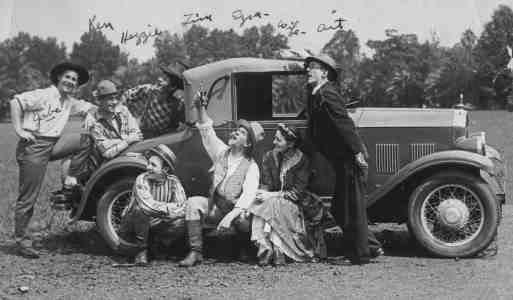On the 70th Anniversary of Germany’s Surrender
 Today, May 7, 2015 is the 70th Anniversary of Germany’s Surrender. In the context of Humor in America, I feel it’s appropriate to mark the occasion with a review of Sam Sackett‘s book, “Adolph Hitler in Oz.”
Today, May 7, 2015 is the 70th Anniversary of Germany’s Surrender. In the context of Humor in America, I feel it’s appropriate to mark the occasion with a review of Sam Sackett‘s book, “Adolph Hitler in Oz.”
Don’t let the title scare you. It’s marvelous, worthwhile read. The premise is basic: With Germany on the brink of its demise, Adolph Hitler fakes his own death and find himself–without fanfare- in the metropolis of Oogaboo on the outskirts of Oz.
In juxtaposition reminiscent of an off-kilter dream, Laurel and Hardy are the first to greet him. Struck by the innocence of the Ozians, and true to his nature, Hitler sets about to convince the “meat people” that they have long been oppressed by a conspiracy of “non-meat people” (including the Scarecrow). But coping with talking animals, raising an army of pacifists and conquering a utopian kingdom that fares well without money is a path fraught with obstacles every step of the way. The unpredictable twists make this story hard to put down.
Though the morality in this tale is painted in simple black and white, Hitler’s encounters otherworldly landscapes, fanciful creatures and lily-hearted eccentrics are rich, nuanced, and witty. The vibe of the book is hard to describe. Think “Dr. Strangelove” meets a secular C.S. Lewis meets Animal Farm, chockablock with Abbott and Costello style interchanges and alive with the imagination and whimsy of an original Oz book. This uncanny exploration of ideologies and human nature makes many interesting points but never gets preachy or mired. Coming in at just under 300 lively pages, it’s a fun, accessible read unlike any other.
Reissued by New York-based Royal Publisher of Oz this children’s story for adults was first released in 2011. The new edition, available in paperback, has been edited to correct minor discrepancies pointed out by L. Frank Baum devotees who know Oz from O-Z. Its layout and illustrations by Patricio Carbajal are reminiscent of the books in Baum’s complete Oz series I discovered in our small neighborhood library years ago. This edition also contains a bonus author’s essay entitled “The Utopia of Oz.”
WHO’S YER HOT SHOTS?
Sam Sackett
If the term “novelty song” did not already exist, it would have to be coined to describe the repertoire of the Hoosier Hot Shots, a quartet that amused audiences for years broadcasting as an act on the National Barn Dance. They were known for such songs as “I Like Bananas Because They Have No Bones” and “When There’s Tears in the Eyes of a Potato”; and for beginning their numbers with “Are you ready, Hexxie?” to which Hezzie replied on a slide whistle, “Wooo-wooo-wooo-woohoo!” It cannot be doubted that they were an inspiration for Spike Jones and His City Slickers, who were damn funny, but never so funny or meaningful as the Hot Shots at their best.
The Hot Shots were begun by two brothers, Kenneth and Paul (Hezzie) Trietsch, who grew up in a musical family on a farm near Arcadia, Indiana (north of Indianapolis). The brothers began their career by touring in vaudeville with their banjo-picking father. When the father retired, the brothers joined an outfit called the Rube Band, where they became friends with a fellow Indiana musician, Charles (Gabe) Ward. When vaudeville succumbed after the 1929 stock market crash, the Rube Band broke up, and the Trietsch brothers and Ward found a nest with WOWO in Fort Wayne, IN, where an announcer first named them the Hoosier Hot Shots. In 1933 they were picked up by WLS in Chicago for a daytime local program and the National Barn Dance, broadcast over NBC, where I heard them every Saturday night for years. The following year they were joined by a fourth musician, Illinois native Frank Kettering, also an alumnus of the Rube Band.
All four members of the group were multidimensional musicians, playing various instruments (especially brass: Ken played the tuba, and Frank fife and piccolo), but their usual instrumentation was Ken Trietsch on guitar, Gabe Ward on clarinet and saxophone, and Frank Kettering on string bass. Hezzie played an assortment of instruments; although he was a drummer, he was most comfortable with a set of slide whistles and a home-made instrument: a washboard mounted with an array of cowbells and rubber-bulb auto and bicycle horns in various keys, pie tins, wood blocks, and garbage can lids. Hezzie’s musicianship in controlling the slide whistle was truly remarkable. Vocally they were a quartet with an occasional solo. Their performances were meticulously designed and rehearsed to sound spontaneous and helter-skelter. For an example, here’s “She Broke My Heart in Three Places.”


